German FM Discusses Hostages With Iranian Counterpart
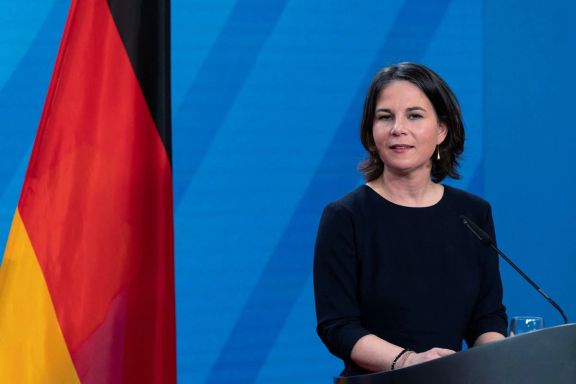
Germany's Foreign Minister Annalena Baerbock spoke with her Iranian counterpart Hossein Amirabdollahian about detained dual-nationals on Wednesday.

Germany's Foreign Minister Annalena Baerbock spoke with her Iranian counterpart Hossein Amirabdollahian about detained dual-nationals on Wednesday.
While officially, the Germany Foreign Ministry only said talks concerned "consular cases", it is believed they focused on the several German citizens currently incarcerated in Iran, including Nahid Taghavi, a dual German-Iranian citizen who was arrested in October 2020 and subsequently sentenced on charges related to "propaganda against the system."
Another high profile case is that of Jamshid Sharmahd, who has been sentenced to execution by the Iranian judicial system. Concerns loom large that this sentence may be carried out imminently.
Sharmahd was accused of leading the pro-monarchist group Kingdom Assembly of Iran, which has been linked to a fatal bombing incident in 2008 and alleged plots for additional attacks within Iran. Sharmahd has denied the accusations.
Diplomatic relations between Iran and Germany remain marked by tension. Foreign Minister Baerbock consistently voicing her concern over the violent suppression of protests in Iran. Meanwhile, the Iranian government has accused both her and the German government of interference in Iran's internal affairs.
It is the first direct exchange between the two countries' foreign ministers since the Munich Security Conference last year.
Iran's diplomatic hostage taking policy has been at the top of the headlines in recent weeks after $6bn of frozen Iranian funds in South Korea is being released in exchange for five US-Iranians, and in return, five Iranians held in the US.
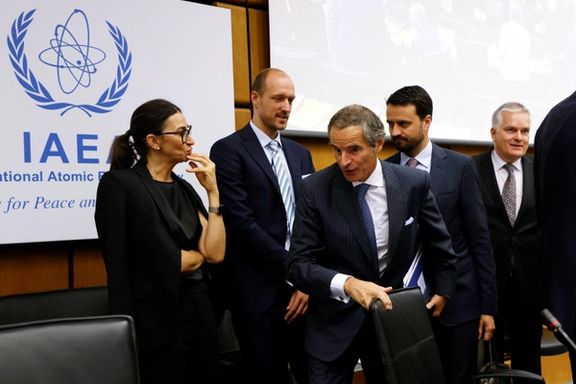
Another meeting of the Board of Governors of the IAEA continued on Wednesday with no effective step to address the questions surrounding Iran’s nuclear program.
Iran is known to have expanded its program significantly since 2018, when the United States unilaterally withdrew from the Iran nuclear deal –or Joint Comprehensive Plan of Action (JCPOA).
On Wednesday, three signatories of the deal, UK, France, Germany (E3) delivered a joint statement at the IAEA Board of Governors meeting, in which they condemned Iran’s lack of transparency with regards to its nuclear program.
The E3 noted that “Iran has not allowed effective verification and monitoring activities in relation to the production and inventory of centrifuges and key components, heavy water and uranium ore concentrate for more than two and a half years.”
Despite their emphasis on Iran’s non-compliance, the E3, much like the US, fell short of introducing measures that would ensure Tehran’s cooperation with IAEA.
In the State Department’s press briefing Wednesday, Spokesperson Matthew Miller refused to comment on why a resolution condemning Iran’s non-cooperation was not introduced at the IAEA meeting. Pressed by a reporter, Miller said the Biden administration would only work with other members “to clearly express that Iran should cooperate fully with the IAEA.”
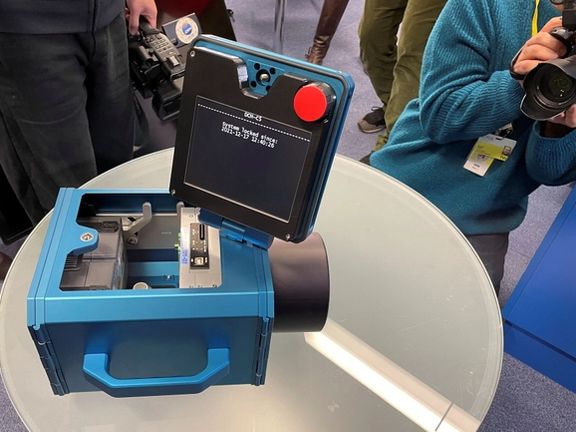
This was in line with a joint statement delivered to the IAEA Board of Governors meeting on behalf of the US and 62 other member states, including all EU countries, Turkey, Kuwait and Saudi Arabia.
“Iran must provide technically credible answers to the IAEA,” the statement read, “in order to address the Agency’s legitimate questions on the outstanding locations, and to resolve the nuclear material discrepancy relating to its Uranium Conversion Facility.”
One major outstanding issue goes back to January 2023, when the IAEA inspectors at Fordow detected undeclared centrifuge configuration changes as well as particles of uranium enriched up to 83.7%.
In March 2023, IAEA Director General Rafael Grossi, visited Iran and brought back an agreement that was hailed as a breakthrough by both sides, but deemed insufficient and non-binding by its critics.
The agreement (or the Joint Statement) stood on the premise that Iran had “expressed its readiness” to “provide further information and access” and “allow the IAEA to implement further appropriate verification and monitoring activities” on a “voluntary” basis.
Six months on, the premise seems to have been shaky at best. According to IAEA,
The IAEA and the international community seem to believe that Iran’s nuclear program has reached levels not seen in countries without a nuclear weapons program.
Authorities in Tehran, of course, maintain that their nuclear program is entirely peaceful and a national right, based on international agreements. But many experts believe Iran’s nuclear expansion is hard to justify outside a weapons program.
For years, the IAEA has tried in vain to verify the nature of Iran’s nuclear activities, as the regime obstructs inspections and dodges questions in what many see as a time-buying tactic.
The Biden administration has so far been reluctant to exert more pressure on Iran over its nuclear program and has instead endeavored to buy the regime’s cooperation with a side deal.
Other western powers have tried to revive the JCPOA, only to get a taste of Tehran’s intransigence –as clearly voiced in the latest E3 statement at the IAEA Board of Governors meeting: “We have made significant efforts to negotiate and agree a return to the JCPOA, for which viable deals were tabled in March and in August 2022. In both cases, it is Iran that refused to sign these agreements, making unacceptable demands going beyond the scope of the JCPOA.
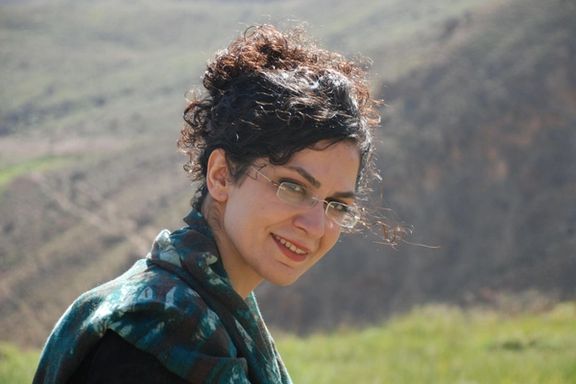
In a letter, Hedayat said, "In honor of all those seeking justice, especially the mothers of the victims, I am ending my hunger strike."
The decision to end her hunger strike - which began in February - coincides with the one year anniversary of the death of Mahsa Amini in morality police custody.
She vowed to continue the fight for justice: "I end my hunger strike, but I will not break my commitment, a commitment to myself and to you, the suffering people of my homeland, until the day the footprint of the Islamic Republic, this anti-freedom regime, is erased from the soil of Iran."
Hedayat's journey as a political prisoner dates back to her sentencing in connection to the protests that erupted following the tragic downing of a Ukrainian passenger plane by the Revolutionary Guards in January 2020. Her sentence amounted to four years and eight months of imprisonment.
In October of the same year, she was apprehended by security forces at the residence of a friend, subsequently being transferred to the women's ward of Evin Prison in November for the execution of her sentence.
However, her ordeal did not end there, as the authorities opened a new case against her in mid-November last year. The new case brought forth several additional charges, including "anti-system propaganda, collusion, and the promotion of corruption."
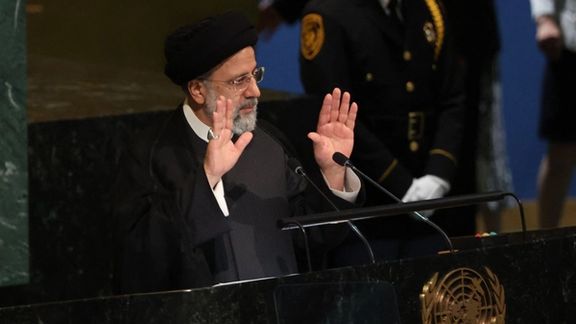
Republican lawmakers are leading a campaign to prevent Iran’s president Ebrahim Raisi from entering the US for the United Nations General Assembly (UNGA) next week.
The invite has caused anger across US Congress as one of the world’s most ruthless political figures is visits the US and is welcomed to the meeting of the world’s leaders.
Rep. Claudia Tenney (R.-NY) and Sen. Ted Cruz (R.-Texas) introduced legislation on Tuesday that will make it illegal for Raisi and his delegation to attend UNGA, according to Washington-based Free Beacon.
Just last year, Raisi delivered a speech that berated the United States for withdrawing from the 2015 nuclear accord and claimed Iran is a beacon of justice, as the country was falling into the worst uprising in its modern history.
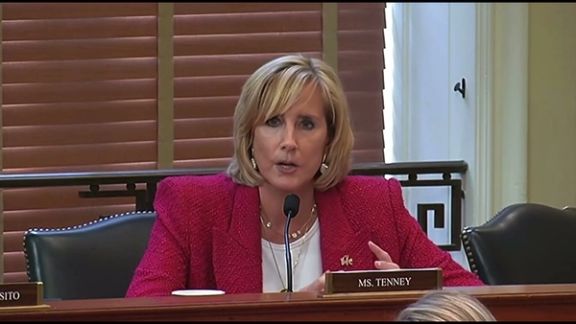
Raisi is also alleged to have been invited to a meeting with the Council on Foreign Relations (CFR). Although no announcement could be found on CFR’s website, a member of the Council, the well known Iranian Jewish writer, Roya Hakakian, wrote a post on X sharing information that she was invited to the meeting but turned down the invitation due to his attending.
Hakakian shared her declining the invitation saying, “Thank you for this invitation, which, I'm afraid, I must decline. While I am an absolutist when it comes to the value of dialogue, I see the presence of Ebrahim Raisi at the Council on Foreign Relations as a political baptism for a man who has been implicated in countless crimes.”
Iran International wrote to the Council on Foreign Relations asking for clarification but has not received a response at the time of this publication. The date of the meeting is not clear, but Raisi will attend the United Nations annual General Assembly taking place in New York City from September 18-26, in spite of an ongoing UN investigation into the regime’s human rights abuses.
Republicans including Tenney and Cruz maintain that Raisi has no right to be hosted in New York City as the regime fosters terrorism across the globe and launches attacks against US forces and allies in the Middle East. Iran is now under heavy sanctions not only for its ongoing nuclear program, but its dire human rights abuses in Iran and its support of Russia's war on Ukraine.
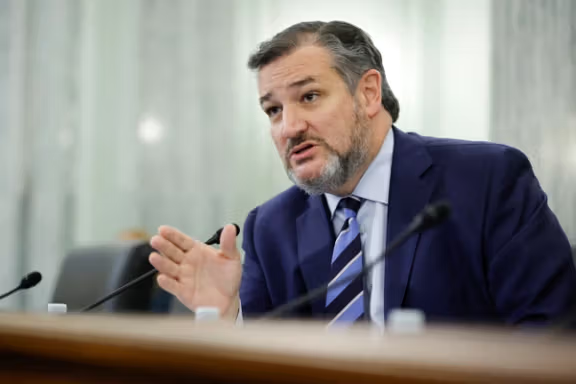
It is unlikely the legislation will pass before Raisi’s arrival but the campaign has garnered support across the board. The legislation, dubbed the SEVER Act, will "show the international community that terrorists are not welcome in the US," Tenney told the Free Beacon.
She added: ”It is imperative we stop Raisi and his associates from setting foot on American soil. Raisi, whose nickname is ‘the Butcher of Tehran,’ has a record of grave human rights abuses and orchestrating terrorist activities worldwide."
Raisi gained his notoriety from events including the mass murder of around 5,000 dissidents in the 1980s and more recently, has defended the brutal suppression of protesters who took to the streets in the wake of the death of Mahsa Amini in police custody.
It is hoped the bill could set a precedent for future Republican administrations to ban controversial figures and dictators, and is based on sanctions issued by former president Donald Trump. However, the first was first introduced by Tenney and Cruz last year, but it did not pass.
The visit by Raisi comes hot on the heels of a hostage deal with the Biden administration that freed up $6 billion in frozen revenue held in South Korea in exchange for five US-Iranian citizens held in Iran. Iran has also negotiated for a prisoner swap, coming out strongly from the deal which has also led to allegations of breach of Congressional laws laid at the Biden administration’s door.

Images showing exiled Iranian chess grandmasters competing against one another has sparked strong reactions in the Persian-speaking online community as top players continue to flee the regime.
Atousa Pourkashiyan's game against fellow exiled Iranian Mitra Hejazipour at the FIDE World Women's Team Championship 2023 in Bydgoszcz, Poland, was a sad day for Iranians who see the game's best competing for different countries.
Last year, Pourkashiyan was among the several female athletes across Iranian sport, who over recent years have chosen to shun the hijab on the world stage. The seven time Iranian women's champion, now competing for the US, played against Hejazipour Wednesday, who now represents France. She was expelled from the national team back in 2020 for refusal to wear the hijab.
Hejazipour, now known as the French chess queen, said: "While playing against Atousa, I wondered what has led us to a point where we are not even members of the same continent today?"
Also at the match was Sara Khadem al-Sharieh, who emigrated to Spain following a controversial game last year in which she competed for Iran without her headscarf, knowing she and her family could never return home after the bold statement in support of the protests in the wake of Mahsa Amini's murder in morality police custody.
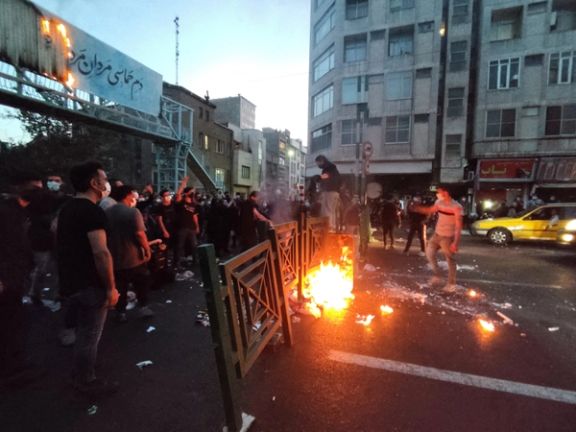
Amnesty International has urged the international community to combat impunity for the brutal crackdown of Iranian protesters by the Islamic Republic.
In a statement released on the occasion of the first death anniversary of Mahsa Amini that catalyzed a revolt later known as the Women, Life, Freedom movement, the human rights organization said the world must pursue pathways for justice at the international level to address systemic impunity for Iranian officials responsible for hundreds of unlawful killings of protesters and widespread torture.
Exacerbated by years of economic and social suffocation and subjugation under the rule of a corrupt autocratic regime, people took to streets across Iran last September. The uprising was dealt with by a bloody crackdown by police and Revolutionary Guard’s agents leaving about 600 protesters dead and tens of thousands detained.
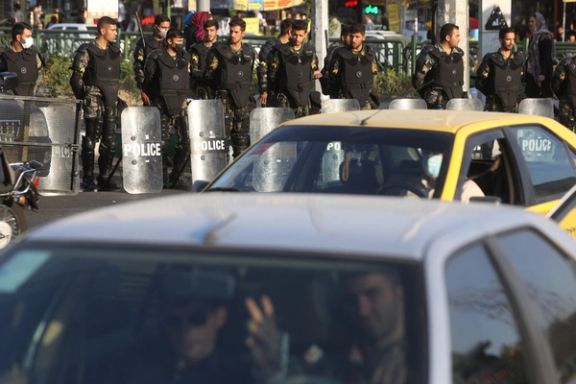
Amnesty pointed out that Iranian authorities have committed a litany of crimes under international law to eradicate any challenge to their iron grip on power over the past year. “These include hundreds of unlawful killings; the arbitrary execution of seven protesters; tens of thousands of arbitrary arrests; widespread torture, including rape of detainees; widespread harassment of victims’ families who call for truth and justice; and reprisals against women and girls who defy discriminatory compulsory veiling laws.”
The group’s Deputy Regional Director for the Middle East and North Africa, Diana Eltahawy, slammed the regime’s authorities for “inflicting unspeakable cruelty on people in Iran for courageously challenging decades of repression and inequality,” noting that “not one official has been criminally investigated, let alone prosecuted and punished for crimes committed during, and in the aftermath of, the uprising.”
She also described the anniversary of the ‘Woman Life Freedom’ protests as “a stark reminder for countries around the world of the need to initiate criminal investigations into the heinous crimes committed by the Iranian authorities under universal jurisdiction.”
Eltahawy also called on the world's leaders to issue statements explicitly calling on Tehran to halt the use of firearms against protesters, stop torturing detainees, and release all detained protesters. “These actions show victims they are not alone in their darkest hour.”
Amnesty decried the regime's raft of new measures against women and girls who defy compulsory hijab, including the confiscation of cars and denial of access to employment, education, healthcare, banking services and public transport as well as finesand degrading punishments, such as washing corpses.
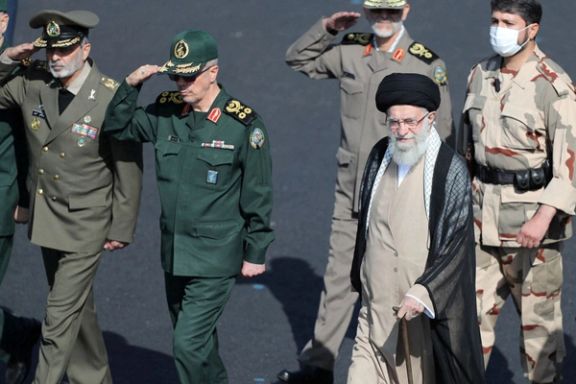
“This assault on women’s rights is taking place amid a spate of hateful official statements referring to unveiling as a 'virus', 'social illness' or 'disorder' as well as equating the choice to appear without a headscarf to 'sexual depravity,’” the right group added.
Amnesty also raised alarm about the detention and summoning of human rights defenders and journalists, saying that “at least 90 journalists and other media workers and 60 lawyers, including those representing families of individuals unlawfully killed,” have been arrested. Scores of other lawyers were summoned for interrogations.
Describing it as “a tsunami of torture,” Amnesty said that to quash the protests security forces fired live ammunition and metal pellets, causing injuries amounting to torture or other ill-treatment to thousands, including blinding, loss of limbs and impaired mobility. “The authorities also oversaw the widespread commission of torture and other ill-treatment against thousands of detained protesters, including children.”
Amnesty International called the establishment of a Fact-Finding Mission on Iran by the UN Human Rights Council in November 2022 as a good measure but insisted that much more is needed “to deter further cycles of bloodshed.”
During the past several days, the international community has stepped up condemnation of Iran’s crackdown on dissent as Iranians are getting ready for more protests on the anniversary of the uprising, but none has so far resulted in tangible results for the people.
The US overwhelmingly passed the MAHSA Act on Tuesday to strengthen Washington’s sanctions on the regime over violation of human rights. Also on Tuesday, members of the European Parliament grilled EU’s foreign policy chief Josep Borrell over the bloc’s Iran policy.






